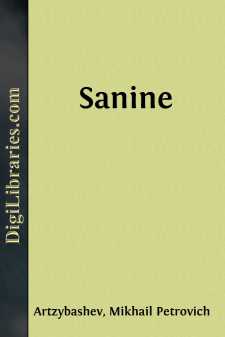Categories
- Antiques & Collectibles 13
- Architecture 36
- Art 48
- Bibles 22
- Biography & Autobiography 813
- Body, Mind & Spirit 142
- Business & Economics 28
- Children's Books 15
- Children's Fiction 12
- Computers 4
- Cooking 94
- Crafts & Hobbies 4
- Drama 346
- Education 46
- Family & Relationships 57
- Fiction 11828
- Games 19
- Gardening 17
- Health & Fitness 34
- History 1377
- House & Home 1
- Humor 147
- Juvenile Fiction 1873
- Juvenile Nonfiction 202
- Language Arts & Disciplines 88
- Law 16
- Literary Collections 686
- Literary Criticism 179
- Mathematics 13
- Medical 41
- Music 40
- Nature 179
- Non-Classifiable 1768
- Performing Arts 7
- Periodicals 1453
- Philosophy 64
- Photography 2
- Poetry 896
- Political Science 203
- Psychology 42
- Reference 154
- Religion 513
- Science 126
- Self-Help 84
- Social Science 81
- Sports & Recreation 34
- Study Aids 3
- Technology & Engineering 59
- Transportation 23
- Travel 463
- True Crime 29
Sanine
Description:
Excerpt
PREFACE
"Sanine" is a thoroughly uncomfortable book, but it has a fierce energy which has carried it in a very short space of time into almost every country in Europe and at last into this country, where books, like everything else, are expected to be comfortable. It has roused fury both in Russia and in Germany, but, being rather a furious effort itself, it has thriven on that, and reached an enormous success. That is not necessarily testimony of a book's value or even of its power. On the other hand, no book becomes international merely by its capacity for shocking moral prejudices, or by its ability to titillate the curiosity of the senses. Every nation has its own writers who can shock and titillate. But not every nation has the torment of its existence coming to such a crisis that books like "Sanine" can spring to life in it. This book was written in the despair which seized the Intelligenzia of Russia after the last abortive revolution, when the Constitution which was no constitution was wrung out of the grand dukes. Even suppose the revolution had succeeded, the intellectuals must have asked themselves, even suppose they had mastered the grand dukes and captured the army, would they have done more than altered the machinery of government, reduced the quantity of political injustice, amended the principles of taxation, and possibly changed the colours of the postage stamps? Could they have made society less oppressive to the life of the individual? Like all intellectuals, M. Artzibashef is fascinated by the brutality of human life, and filled with hatred of his own disgust at it. As with all artists, it is necessary for him to shake free of his own disgust, or there will be an end of his art. Intellectual and an artist, less artist for being intellectual, responding to the despairing mood of those around him, it became clear to him that political agitation had failed and must fail because it has a vision of government and no vision of human life. Society is factitious. The intellectual asks why. The artist never asks these absurd questions. Art is free. If he can attain art that is enough for him. Life, whether or no it be the slow process of evolution it is generally supposed to be, can and does look after itself. Society is certainly a nuisance and a heavy drag upon human energy, but so long as that energy can express itself in art, society cannot be altogether obstructive. That, says the intellectual, is well enough for the artist, but what of the individuals to whom art can only be at best a keen stimulus, at worst a drugging pleasure? Is the dead weight of society altogether to crush their delight in life? What is society? What is it but the accumulated emanations of the fear and timidity and shyness that beset human beings whenever they are gathered together? And to this accumulation are those who are not artists to bring nothing but fear and shyness and timidity to make the shadow over life grow denser and darker? Is there to be no reaction?...


